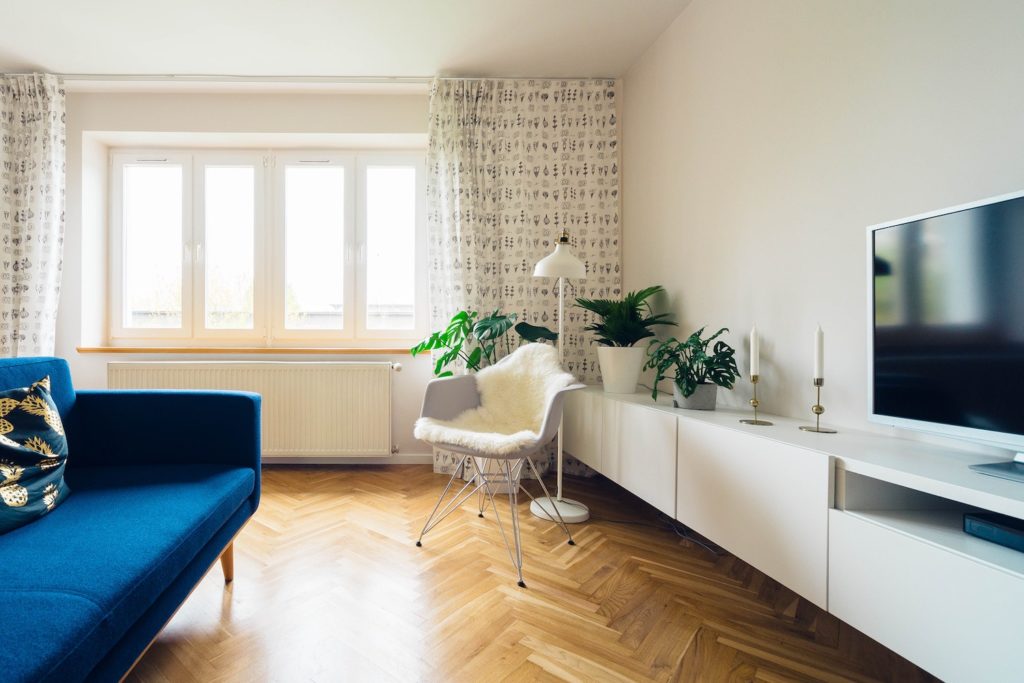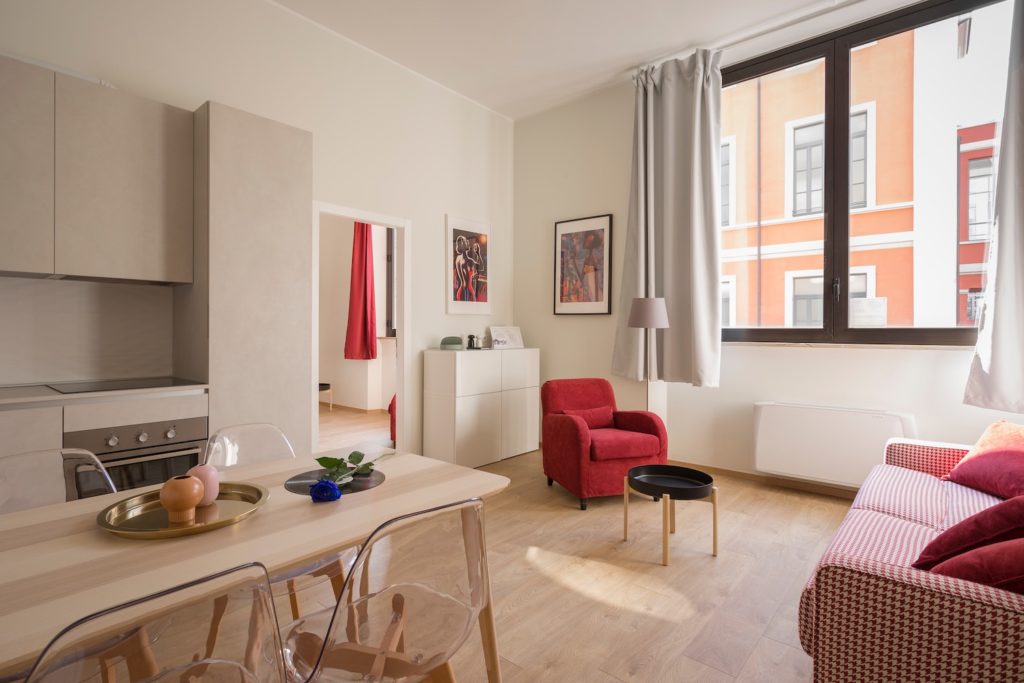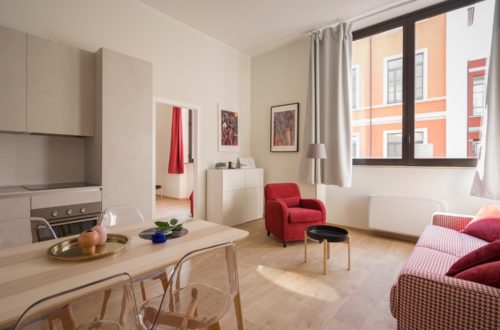Most expats first consider renting furnished accommodation when settling in a new country. However, before making this decision, it is important to understand the differences and the impacts of the type of rental you choose. Furnished vs unfurnished, the French market specificities revealed for you to make the best decision to meet your needs.

Table of Contents
The furnished vs unfurnished rental market
The furnished rental market can be less dynamic than the unfurnished one in France.
If you are settling in a big city, you will have furnished property options, but unfurnished properties remain the most common. Finding a furnished property in a small town or the countryside can be a real challenge as the supply is really low.
Just so you have an idea: in Paris, furnished rental properties represent roughly 20% of the rental market and in the rest of France less than 10%! You now understand the challenge it can be to find a furnished place!
Also, most of the furnished properties are small apartments, and family-size properties are very rare and therefore expensive.
Therefore, if you don’t manage to find a furnished property matching your requirements, you may need to consider renting unfurnished and buying furniture.
There are many options to buy cheaper furniture, maybe second-hand or from another repatriating expat.
Besides the property availability, there are other factors to take into account before starting your house hunting and signing a lease.

The main differences: furnished vs unfurnished properties
Your initial expenses
The first visible difference is the rent amount between the two options.
The rent is 10 to 20% higher for furnished properties. This difference is explained by the investment made by the landlord to furnish the property.
Depending on how long you will stay in France, you may want to compare the cost of furnishing an apartment and the rental difference. For example, if you furnish a studio apartment, the budget can go between €2,000 and €6,000 for brand-new elements, depending on the quality and also if the kitchen is equipped.
Yes, that’s right, many apartments in France have an empty kitchen! There could only be a sink, but no fridge, stove, oven, microwave…
For this reason, when you need to furnish an entire apartment from scratch, the second-hand option is very common. Then, you will be able to replace some furniture or appliances if you wish.
Readers who liked this post also read
Guiga – Expat in France
How to take out the insurances you really need?
The security deposit
There are several differences between a furnished apartment rental contract and an unfurnished one. The security deposit is one of them.
The security deposit amount for an unfurnished apartment should not be higher than one month’s rent before charges*.
The security deposit for a furnished apartment should not be higher than two months of rent before charges.*
The separate amount of the rent and the charges should be mentioned in the contract.
INSIDER TIP: If the flat you are renting is furnished or half furnished and it is stated as unfurnished in the contract, the landlord will not be able to reduce your security deposit if there are any damages to the furniture. Because theoretically there is none in the flat. Also, this means that if furniture needs to be changed the landlord has no obligation to change it if it is an unfurnished rental contract.
* Charges are a tax including the maintenance of the common area, the elevator or the concierge salary (if applicable).
The contract duration
All the unfurnished apartment contracts should be of 3 years, and renewable for the same duration.
If the apartment is the tenant’s main residence (more than 8 months per year), the furnished apartment contract should be one year renewable (unless for students where it is 9 months and not renewable to match the academic year duration).
The tenant break clause
The break clause should always be notified by either party by sending a registered letter with an acknowledgement of receipt. If you have a good relationship with your landlord, you can let him know via a phone call or email, but I would always recommend also sending a formal letter.
Unfurnished properties: There is a 3-month tenant break clause minimum. It is the general rule. There is an exception for big urban areas: the tenant break clause will drop to one month. This exception applies to a specific list of cities, about 30 urban areas. The largest French cities will be on the list, although, based on the rental market (supply and demand), it may change. It is, therefore, better to check here whether the shorter break clause still applies to your town of choice.
Furnished properties: The applicable tenant break clause is one month, regardless of where the property is located.
The landlord break clause
Unfurnished properties: The real-estate law in France in terms of rentals very strongly protects very tenants’ housing rights. As a consequence, on a 3-year lease, a landlord cannot ask the tenant to vacate for 3 years, in very rare exceptions, in which case the landlord break clause is 6 months!
The main reasons that would allow a landlord to use the break clause would be:
- Selling the property
- Landlord or close relative is moving into the property
- For serious and legitimate reasons, that is the tenant didn’t comply with their obligations.

Furnished properties: The same as for the unfurnished properties, the landlord break clause option is very limited and very controlled. If this happens, it should be for 3 months.
These rules do not apply if the apartment is not the tenant’s main residence, such as short lets or holiday rentals.
Here is a table summarising the above:
| Unfurnished | Furnished | |
| Contract duration | 3 years contract renewable | 1-year contract (or 9 months for students) |
| Security deposit | 1 month’s rent maximum | 2 month’s rent maximum |
| Tenant break clause | 3 months minimum (or 1 month in certain areas) | 1-month minimum |
| Landlord break clause | 6 months minimum (under exceptional conditions) | 3 months minimum (under conditions) |
Criteria for an apartment to be considered furnished
A property cannot be rented as furnished if a list of legally determined items is not provided by the landlord for the main residence:
1. Bedding, including a duvet or bed covering
2. Curtains or shutters in the bedroom or sleeping area
3. Cooking hobs
4. Oven or microwave oven
5. Refrigerator and freezer, or, as a minimum, a refrigerator with a compartment keeping food at temperatures on or below – 6 °C
6. Cooking utensils
7. Table and chairs
8. The necessary tableware and silverware to serve a meal
9. Cleaning utensils adapted to the type of home
10. Storage shelves
11. Lighting fixtures
To keep in mind
In short, if you are staying for more than a year, it may be worth considering renting unfurnished as the choice will be made profitable the longer you stay depending on the size of the property and the cost of the furniture you choose. Also, the 3 years unfurnished lease with a tenant break clause gives you more flexibility than the one-year furnished rental contract.
I hope this article helped you to see more clearly between furnished vs unfurnished rentals in France. Hopefully, you will find a property quickly with my 5 tips to look for rental accommodation in France! Good luck!
If you have found this article useful, let me know by giving a thumb up, you can also give a comment to share your experience.
Thank you!
Furnished vs unfurnished in France FAQ
What should a furnished rental include?
French law lists the furniture and items to be included in the rental property in order to be marketed as a furnished property. It should be clearly indicated in the rental contract that the property is rented as furnished (or unfurnished) as it will impact several aspects of the rental.
What are the main differences between a furnished and unfurnished rental?
There are 4 main differences between furnished and unfurnished, besides the fact of having furniture or not.
The rental contract duration, the security deposit amount, the tenant break clause and the owner break clause.
What is the deposit?
The rental deposit is paid to the rental agency or the owner once the lease is signed. It can be before the start date of the contract. It is usually one-month rent for long-term rental. Holding deposits without having a signed contract is illegal in France.
Is it easier to find a furnished or unfurnished long-term rental in France?
Unfurnished properties are much more common in France. You will have more options of furnished properties in Paris but they still only represent about 20% of the long-term rental properties!
This number drops down to 10% in the other French cities and even less in the countryside. Considering renting an unfurnished property with an equipped kitchen will definitely broaden your options.
For more information on French housing, check out my other related posts:
Rental accommodation: the landlord’s responsibilities


